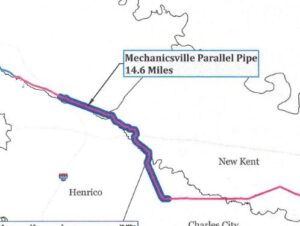
By Steve Haner
First published this morning in the Fredericksburg Free Lance-Star.
To the modern environmental movement, natural gas is the Devil’s own breath. It must be opposed in every form on every front.
This explains the existential battle being fought over what would otherwise be considered fairly minor capital enhancements to an existing gas pipeline connecting Northern Virginia and Hampton Roads. Virginia Natural Gas is seeking to increase the capacity of that line with a 6-mile extension to connect to the Transco pipeline near Quantico.
Those six miles are the only new section of pipeline in the Header Improvement Project. Elsewhere, the existing pipeline will see three miles of parallel pipe added to increase capacity in Fauquier County and 14 miles more north and east of Richmond. Three compressor stations are also proposed, one each at the northern and southern ends and one in the middle of the route near Ladysmith. The whole project is priced in at about $345 million.
The objections display hypocrisy. Opponents of the proposed multi-billion dollar Atlantic Coast and Mountain Valley natural gas pipelines have often pointed to the actual or potential capacity of the state’s existing lines. Those are sufficient for Virginia’s needs, they say. The minor proposed improvements strengthen that argument, and logically should be embraced by those opposed to the mega-projects to the south.
Yet VNG’s proposal is drawing the same level of heated opposition as the major projects, with their hundreds of miles of new construction. Even a six-mile extension of an old pipeline is a path to perdition.

One reason, of course, is that some of the new capacity is proposed to serve a new natural gas electricity plant planned for Charles City County, just east of Richmond. The merchant generator, not owned by Dominion Energy Virginia, will sell power into the regional electricity market. That, of course, would put it in competition with Dominion’s hugely expensive electricity from off-shore wind and far-less reliable electricity from solar panels.
The dispute sparked a May 11 letter to the State Corporation Commission, which is considering the pipeline expansion application, from a dozen virtue-signaling Democratic state legislators, complaining of “inherent risk to human health, the environment, and ratepayers.” They cite fears that with the project in place, seas will rise, droughts will increase, heavy rains will surge (no contradiction noted) and fisheries will disappear.
Their silliest complaint? Because of COVID-19, there is now too much economic uncertainty, they write. This would be the economic uncertainty caused by the panicked economic lockdown, an economic calamity which they want continued.
The usual suspects are in the case as participants, citing similar concerns: The Southern Environmental Law Center, Sierra Club, Chesapeake Climate Action Network, and the Chesapeake Bay Foundation. Governor Ralph Northam’s Department of Environmental Quality has also weighed in with a series of demands it wants the SCC to impose on Virginia Natural Gas. There appear to be more than 1,000 public comments already on the record, in support and opposition.
Far too many electricity generation assets are held by monopoly utilities. Environmental activists want the maximum opportunity for private individuals or entities to make their own renewable energy, for their own use or for sale. Agreed. Yet, the idea that private enterprise would move forward with an independent fossil fuel plant on the same basis, undeterred by the new carbon taxes the General Assembly has approved, appalls them. This is more hypocrisy.
The real problem here is the key role natural gas will and must play in Virginia’s energy future, whether the environmental purists can accept it or not. The same people exploded earlier this month when Dominion Energy Virginia filed an integrated resource plan which stated the obvious: Wind and solar generation will not power our economy by themselves, ever. Dominion also needs to keep its nuclear and natural gas fleets running into the foreseeable future or must import such power from some other state.
Rational Virginians need to cheer that admission from the utility unless they relish periods of cold and dark in their future. The environmental movement, according to Michael Moore’s latest film “Planet of the Humans,” is funded these days by the investors behind the wind and solar industries. They must fight the gas alternative to the bitter end. The only way to make wind and solar truly viable choices is to denigrate and shut down the cheaper and better alternatives.

Leave a Reply
You must be logged in to post a comment.